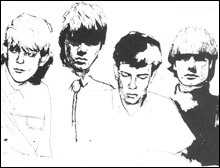
GLASWEGIAN WOOD: In the days of the grim, pleasure-denying sound of Joy Division, Orange Juice offered signs of a pop-inflected counterstrike. |
In an FAQ for his UK-based label 12XU, Matador head and contrarian tastemaker Gerard Cosloy recently wrote: “No, post-punk does not actually exist.” That claim would come as a surprise to Simon Reynolds, whose book Rip It Up attempts to gather an explosive variety of late-’70s/early-’80s musical activity under the post-punk banner — not to mention to anyone who uses the label as a critical catchall for current artists, from Interpol to DFA, who sound to many ears like the belated report from a two-decade-old blast of innovation.Even so, you can see Cosloy’s point: “post-punk” never designated a musical genre so much as a point of origin. Especially in the UK, the bands arrayed by Reynolds took the slate-wiping Year Zero rhetoric of the Sex Pistols and their brethren so much to heart that they quickly shed punk’s own drainpipe-straight confines to embrace new instruments and technologies (Pere Ubu, Cabaret Voltaire) and black musics from funk to dub to disco (the Pop Group, PiL). Still others drew from the more academic end of experimental music, like Wire, from whose songbook Cosloy’s British label takes its name.
In the face of this forking garden of stylistic options, a recent spate of reissues confirms that many of the offshoots are more fun to sniff to than to taxonomize. Such releases are often by-products of the rage for a given subgenre’s current practitioners. Earlier in this decade, the rise of a clutch of New York–based dance-rock acts (Liars, the Rapture, Radio 4) led to an outpouring of material from their early-’80s East Village counterparts, especially those associated with the storied ZE label. More recently, namechecks by — and critical comparisons to — Franz Ferdinand have renewed interest in a pair of their Scottish predecessors.
Wearing its geography on its sleeve, The Glasgow School (Domino) is the first US collection of Orange Juice’s singles on that city’s Postcard imprint in 1980-’81, along with album sessions scrapped after label mastermind Alan Horne encouraged the band to sign to Polydor. Although Reynolds’s book is named for a later line-up’s biggest UK hit, these early releases are pivotal to his story. In their time, when the grim, pleasure-denying sound epitomized by Joy Division was de rigueur in British independent music, “Simply Thrilled Honey” and “Falling and Laughing” were signs of a pop-inflected counterstrike.
The songs of Edwyn Collins and James Kirk reveled in middle-eights and clever modulations; meanwhile their guitars found an unlikely meeting ground between Nile Rodgers and Roger McGuinn. The band had its perversely arty side as well, backing one single with the instrumental “Moscow” and its rudimentary dub remix (“Moscow Olympics”) and capping Kirk’s fey “Poor Old Soul” with a sudden football cheer of “No more rock ’n’ roll for you.” There are only two unreleased cuts on The Glasgow School, but they mark the pop and punk extremes the band synthesized: “Blokes on 45,” a five-song medley modeled on the novelty hit “Stars on 45 Medley,” and a rehearsal-room take of the Stooges’ “I Don’t Care” credited to the members’ previous incarnation as the Nu-Sonics.
 Related
Related:
APB, Post-punk prophet, Y'all come back now . . ., More 
- APB
Thanks largely to a massive revival in everything post-punk, the neo-new-wave resurgence, and the timely appearance of Simon Reynolds’s Rip It Up and Start Again , anything from the ’80s is fair game for vault diggers — even Scottish pop.
- Post-punk prophet
With a narrative arc that begins in the London dub dungeon of Public Image Limited and ends in the worldbeating semen storm of Frankie Goes to Hollywood, the whole grand experiment of post-punk is tracked and given coherence.
- Y'all come back now . . .
I've always liked the idea of there being some weight to the "nines," meaning: if you're a year, and you're going to perch yourself at the very edge of a decade, you'd better be ready to represent.
- Harmonic convergences
Beyond their artful, crackling, dueling-guitar geometrics and layers of cunning rhythms, the Futureheads' most distinguishing and potent weapon is their four-part vocals.
- Harmonic convergence
“I don’t know what to do with myself,” Ross Millard mutters, shrugging at his mates as he sets his guitar down at the rear of the small stage at the back of Seattle’s East Street Records and ambles toward his mic stand.
- Death Cab for Cutie and Franz Ferdinand
Refugees from the heady indie explosion of 2003, Franz and Death Cab are currently sharing space on a concert poster featuring an emo-like Band-Aid heart and a MySpace logo.
- Review: Franz Ferdinand's Tonight: Franz Ferdinand
On their third full-length, Franz Ferdinand continue to kick out that post-punk/disco thrust that made past singles "Take Me Out" and "Do You Want To" such loosened-skinny-tie pleasures.
- The Faint
It’s as if I were at a party where they’re endlessly playing “Dead or Alive” while some guy next to me mumbles nonsense in my ear and some kid in the corner hits random keys on a Juno.
- Going on sale: February 10
Franz Ferdinand & Death Cab, Thursday, Alkaline Trio, Neko Case, and more.
- VHS or Beta
The wordless, minute-long opener “Euglama,” though — that’s worth digging.
- Mando Diao
The rollicking rock of Mando Diao’s Hurricane Bar , slotted the Swedish group somewhere among the Strokes, the Hives, and Franz Ferdinand.
- Less

 Topics
Topics:
Music Features
, Celebrity News, Entertainment, Edwyn Collins, More  , Celebrity News, Entertainment, Edwyn Collins, Nile Rodgers, Music Stars, Music, Music Reviews, Pop and Rock Music, Punk Rock, Interpol, Less
, Celebrity News, Entertainment, Edwyn Collins, Nile Rodgers, Music Stars, Music, Music Reviews, Pop and Rock Music, Punk Rock, Interpol, Less 